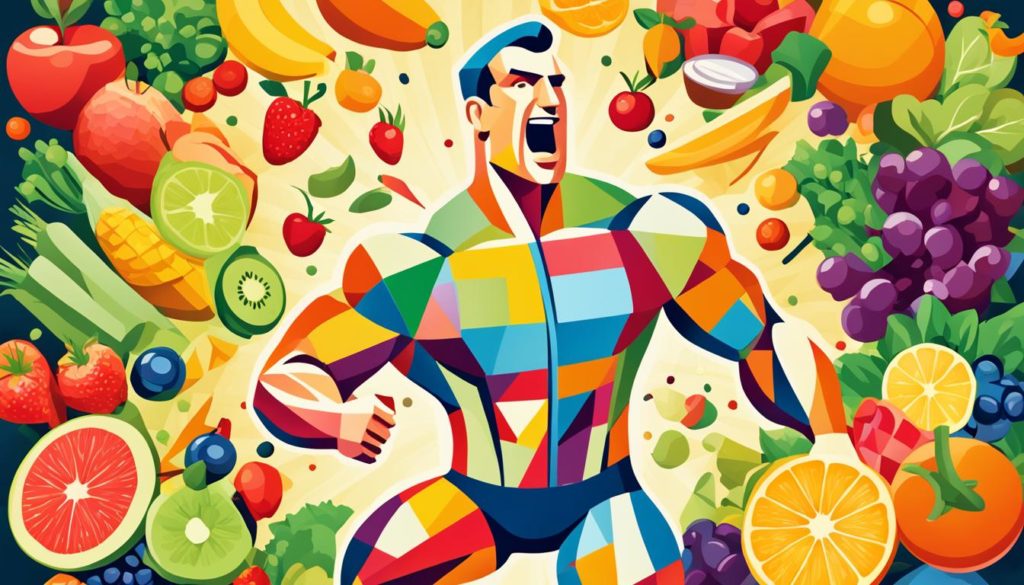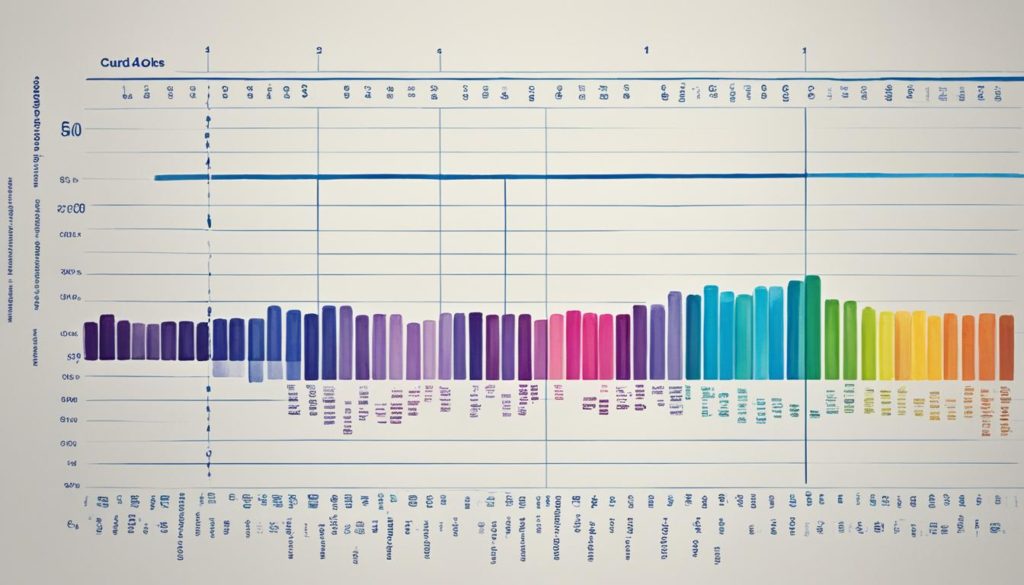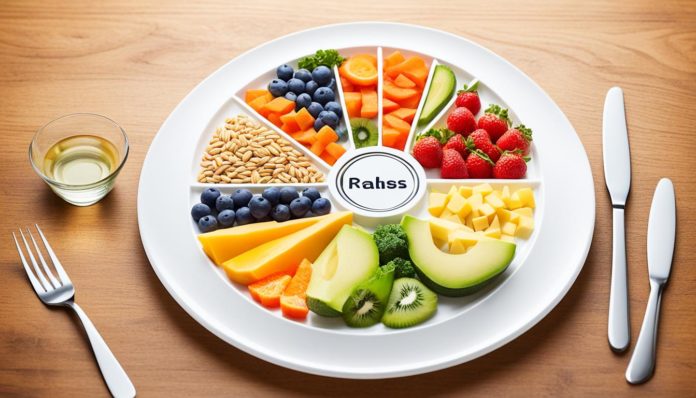Did you know only 12% of Americans get the right amount of calories for good health? Knowing how many calories you need is key for managing weight and staying healthy. This guide will help you understand calories and how tracking them can change your life for the better.
Calories are what power our bodies, from simple tasks to hard workouts. But it’s not just about how many calories you eat. The quality and balance of those calories are also crucial for good health. Whether you want to lose, keep, or gain weight, managing your daily calories is important.
This guide will give you important tips on how many calories you should eat each day. We’ll look at factors like your age, gender, and how active you are. Let’s explore how knowing and controlling your calorie intake can lead to a healthier life.
Key Takeaways
- Understanding your daily calorie intake is essential for overall health.
- Calories fuel all bodily functions and activities.
- Maintaining a balance of quality and quantity of calories is crucial.
- Factors like age, gender, and activity level affect your daily energy requirement.
- Proper management of calorie intake can aid in weight loss, maintenance, or gain.
Understanding Calories and Their Importance
Calories are key in nutrition and health. Knowing what they are and why they matter helps us make better food choices. This leads to better health and a longer life. Calories are the energy source for our bodies, powering everything from breathing to thinking.

What Are Calories?
Calories are the energy our bodies get from food and drinks. They are vital in nutrition and diet plans. Each type of food—carbs, proteins, and fats—has a certain number of calories. These calories help with metabolism, exercise, and fixing tissues.
Why Calories Matter for Health
Calories are important for staying healthy. They help keep our bodies in balance, matching what we eat with what we burn. This balance is key for good health, keeping a healthy weight, and avoiding diseases.
Science shows that eating the right number of calories is crucial. This depends on things like age, gender, and how active you are. So, calories do more than just give us energy; they’re key for our overall health and happiness.
Factors Affecting Daily Caloric Needs
Your daily calorie intake depends on your age, gender, and how active you are. Knowing these factors helps you figure out what you need.
Age and Metabolism
As we get older, our metabolic rate slows down. This means we need fewer calories. Young people need more calories to grow and have lots of energy. Older adults need fewer calories to stay at a healthy weight.

Gender Differences in Caloric Needs
Men and women have different calorie needs because of their bodies. Men usually have more muscle and a faster metabolic rate than women. This means they need more calories. Women might need fewer calories, especially during pregnancy or menopause.
Activity Level and Caloric Requirements
How active you are affects how many calories you need. If you sit a lot, you’ll need fewer calories than someone who is always on the move. Knowing your activity level helps you set the right calorie intake for your health.
| Age Group | Gender | Activity Level | Caloric Needs (per day) |
|---|---|---|---|
| Children (4-8 years) | Both | Moderately Active | 1,400 – 1,600 |
| Adolescents (9-13 years) | Both | Active | 2,000 – 2,600 |
| Adults (19-30 years) | Male | Active | 2,400 – 3,000 |
| Adults (19-30 years) | Female | Active | 2,000 – 2,400 |
| Seniors (50+ years) | Both | Sedentary | 1,600 – 2,000 |
How to Calculate Your Daily Calorie Intake
Knowing how many calories you need each day is key for diet planning. It helps you meet health and fitness goals. We’ll show you how to use a calorie calculator and adjust your intake for weight management.
Using a Calorie Calculator
A calorie calculator is a great tool for figuring out your daily caloric needs. It looks at your age, gender, weight, height, and activity level. Just enter your info, and it will tell you how many calories you should eat daily.
For the best results, make sure to fill in all the details. Online calorie calculators also offer meal plans and diet tips. These can help you stick to your diet goals.
Adjusting for Weight Goals
Once you know your daily caloric needs, adjust them for your weight goals. Whether you want to lose, gain, or keep your current weight, changing your calorie intake is important:
- Weight Loss: To lose weight, eat fewer calories than you burn. Aim to cut your daily intake by 500 to 1,000 calories.
- Weight Gain: For weight gain, eat more calories than you burn. This means adding 500 to 1,000 calories to your daily diet.
- Weight Maintenance: To keep your weight, match your calorie intake with your expenditure. Keep an eye on your diet and activity level and adjust as needed.
By using a calorie calculator and making personal adjustments, you can figure out your daily calorie needs. This helps with diet planning and reaching your health goals.
Recommended Daily Calorie Intake for Optimal Health
It’s key to know the Nutrition Guidelines for getting enough calories for good health. Groups like the USDA and WHO give advice on how many calories you should eat. This depends on your age, gender, and how active you are.
Here’s a table that shows how many calories you should eat each day. It helps match your diet with health standards for better well-being:
| Category | Caloric Intake |
|---|---|
| Children (Ages 4-8) | 1,200 – 1,800 calories/day |
| Girls (Ages 9-13) | 1,600 – 2,200 calories/day |
| Boys (Ages 9-13) | 1,800 – 2,600 calories/day |
| Adult Women | 1,800 – 2,400 calories/day |
| Adult Men | 2,200 – 3,000 calories/day |
This table is a basic guide. You might need to change the numbers based on your health, metabolism, and lifestyle. Talking to health experts can help make a plan that fits you well.
Following these nutrition guidelines can lead to better health and avoid calorie problems. This means a better quality of life.
Nutrition Guidelines for Balanced Calories
Learning how to balance calorie intake is key for good health. A good way is to follow structured dietary recommendations. These focus on proteins, fats, and carbohydrates.
- Proteins: Important for muscle repair and immune function. Sources include lean meats, beans, and nuts.
- Fats: Essential for brain health and energy. Opt for healthy fats found in avocados, olive oil, and fish.
- Carbohydrates: Main energy source for the body. Prefer whole grains, fruits, and vegetables.
| Nutrient | Calories per Gram | Recommended Percentage of Daily Intake |
|---|---|---|
| Protein | 4 | 10-35% |
| Fat | 9 | 20-35% |
| Carbohydrates | 4 | 45-65% |
By spreading your calories among these nutrients, you follow effective dietary recommendations. This supports long-term health through healthful eating and a balanced diet.
Daily Caloric Needs for Different Age Groups
It’s key to understand the unique nutritional needs at every stage of life for good health. The amount of calories needed changes a lot with age, sex, and how active you are. Making sure you get the right number of calories is important for each life stage.
Children and Adolescents
Kids and teens need lots of calories to grow and stay energetic. Their calorie needs go up with growth spurts and more activity. For more info on what kids and teens should eat, check out this calorie chart.
- Children (4-8 years): 1,200-1,400 calories/day
- Boys (9-13 years): 1,800-2,200 calories/day
- Girls (9-13 years): 1,600-2,000 calories/day
Adults
As adults get older, their metabolism slows down, changing their nutritional needs. Active adults need more calories to stay healthy and avoid gaining weight.
- Men (19-30 years): 2,400-3,000 calories/day
- Women (19-30 years): 1,800-2,400 calories/day
- Moderately Active Adults (31-50 years): Men: 2,200-3,000 calories/day, Women: 1,800-2,200 calories/day
Seniors
Older people need fewer calories because they move less and their metabolism slows. But, it’s still important to eat nutrient-rich foods to get enough vitamins and minerals. Adjusting calories for seniors helps manage health issues and keep muscle mass.
| Age Group | Caloric Needs |
|---|---|
| Men (51+ years) | 2,000-2,800 calories/day |
| Women (51+ years) | 1,600-2,200 calories/day |
It’s crucial to meet nutritional needs at every life stage for a balanced diet. For detailed guidelines on daily calorie needs, look at this calorie chart.
Ideal Calorie Intake for Weight Maintenance
Keeping a healthy weight is key for good health and happiness. It’s important to know about your Basal Metabolic Rate (BMR) and how it affects your daily calorie needs. Let’s dive into these topics to help you keep your desired weight.
Understanding Basal Metabolic Rate (BMR)
Your Basal Metabolic Rate is the number of calories your body burns while you’re just sitting there. It’s needed for things like breathing, digesting food, and keeping your body warm. Knowing your BMR helps you figure out how many calories you need every day. You can use your age, gender, weight, and height to calculate it. The Harris-Benedict equation is a popular way to do this. You can also use an online calorie calculator to get an estimate.
Calories for Weight Maintenance
Once you know your BMR, think about how many calories you burn doing things like exercise and everyday activities. Your Daily Energy Expenditure is your BMR plus the calories you burn moving around. To keep your weight the same, you should eat the same number of calories as you burn.
- Calculate your BMR using a reliable calorie calculator.
- Estimate your daily activity level and determine your Total Daily Energy Expenditure (TDEE).
- Make sure you eat the same number of calories as your TDEE to keep your weight stable.
By following these steps, you can manage your calorie intake to stay at a healthy weight.
Adjusting Caloric Intake for Weight Loss
Losing weight takes careful planning and dedication. Managing your daily caloric intake is key. Learning how to create a caloric deficit and using healthy strategies can help you lose weight in a sustainable way.
Creating a Caloric Deficit
A caloric deficit for weight loss means eating fewer calories than your body needs to stay at your current weight. This makes your body use stored fat for energy, helping you lose weight. To get a caloric deficit, you can eat less or move more.
Healthy Weight Loss Strategies
Effective dieting is about eating mindfully and staying active. Here are some tips for sustainable weight loss:
- Mindful Eating: Eat foods rich in nutrients like fruits, veggies, lean proteins, and whole grains. This makes you feel full and keeps you within a caloric deficit.
- Exercise Regularly: Do cardio activities like jogging, cycling, or swimming. Strength training can boost your metabolism and help build muscle.
- Monitor Your Progress: Keep a food diary or use apps to track your meals and workouts. This helps you stay on track and adjust your diet and exercise as needed.
- Stay Hydrated: Drinking lots of water helps with digestion and keeps you feeling full, preventing overeating.
Using these strategies, you can create a balanced plan for losing weight. This ensures you reach your goals in a healthy and lasting way.
Strategies for Increasing Caloric Intake for Weight Gain
For those wanting to gain weight, especially muscle, it’s key to eat more calories. Understanding how to get a caloric surplus and choosing the right foods and exercises is vital.
Nutrient-Dense Foods for Weight Gain
To gain weight, eat foods high in calories but also rich in nutrients. Here are some top choices:
- Avocados
- Nuts and seeds
- Whole grains
- Lean meats
- Full-fat dairy products
These foods boost your calorie intake and give you the nutrients you need for good health. Eating a mix of these foods every day can help you gain weight steadily.
Building Muscle Mass
Building muscle is more than just eating a lot. You also need a good exercise plan. Strength training is key to making the most of a caloric surplus. Here are some tips for building muscle:
- Consistent weight lifting
- Progressive overload techniques
- Compound exercises (e.g., squats, deadlifts, bench presses)
- Balanced rest and recovery periods
Adding these to your workout routine helps grow your muscles. Remember, you also need enough protein to help muscles repair and grow. A diet full of high-calorie foods and a strong workout plan will help you gain muscle effectively.
Healthy Eating Plan to Meet Daily Calorie Requirements
Getting a healthy diet right means planning well and knowing how many calories you need each day. Good meal prep and the right mix of nutrients are key to reaching your diet goals.
Meal Planning Tips
Starting with meal prep begins with planning your daily calories. Here’s a simple plan to follow:
- Figure out how many calories you need based on your health.
- Plan a weekly menu with a variety of foods to keep things interesting.
- Use pre-portioned containers to keep serving sizes right and stay consistent.
- Include protein, carbs, and healthy fats for a balanced diet.
- Make a grocery list to stick to healthy shopping and avoid impulse buys.
- Prep meals in advance for busy days to dodge unhealthy quick eats.
Balancing Macronutrients
Getting the right balance of proteins, carbs, and fats is key for health. Here’s a simple guide:
| Macronutrient | Recommended Percentage of Daily Calories | Examples |
|---|---|---|
| Protein | 20-35% | Chicken, Fish, Beans |
| Carbohydrates | 45-65% | Whole Grains, Vegetables, Fruits |
| Fats | 20-35% | Avocado, Nuts, Olive Oil |
Getting your macronutrients right helps with calorie planning and boosts energy and health. Using these tips in your meal prep makes it easier to meet your diet needs and live a healthy life.
Conclusion
In this guide, we explored the importance of daily calorie intake for our health. We learned how calories affect our energy balance and overall well-being. It’s crucial to think about your age, gender, and activity level when figuring out how many calories you need.
Whether you want to keep your weight, lose weight, or gain weight, knowing your ideal calorie intake is key. Tools like calorie calculators can help you set your intake based on your goals. A balanced diet that includes all nutrients helps match your calorie intake with your lifestyle.
Getting the right balance of calories is vital for staying healthy. By following personalized calorie guidelines and eating healthy, you can meet your nutritional goals. Taking a smart approach to calories sets the stage for a healthier life.
FAQ
What is the recommended daily calorie intake for optimal health?
The amount of calories you need daily changes based on your age, gender, how active you are, and your health. On average, adult women should get about 1,800-2,400 calories a day. Adult men need around 2,200-3,000 calories. Adjust your calorie intake based on your unique needs and goals.
How does age affect daily caloric needs?
As you get older, your metabolism slows down. This means you need fewer calories to stay at your current weight. Kids and teens need more calories for growth and development. Seniors might need fewer calories because they’re less active and their metabolism is slower.
Do men and women have different calorie requirements?
Yes, men and women need different amounts of calories because of their body size and metabolic rates. Men usually need more calories because they have more muscle, which burns calories even when you’re resting. But, everyone’s needs can vary, so it’s best to get personalized advice on nutrition.
How can I calculate my daily calorie intake?
An online calorie calculator can give you an idea of how many calories you need. It looks at your age, gender, weight, height, and activity level. These calculators use formulas like the Harris-Benedict Equation to estimate your daily calorie needs.
What is a calorie deficit and how does it aid weight loss?
A calorie deficit means you eat fewer calories than your body burns. This makes your body use stored fat for energy, helping you lose weight. Losing weight safely usually means eating fewer calories and moving more.
What are some strategies for gaining weight in a healthy manner?
To gain weight in a healthy way, eat foods that are full of calories and nutrients. Eat more healthy fats, whole grains, and foods high in protein. Also, doing strength training can help you build muscle and gain weight in a healthy way.
How important is balancing macronutrients in a healthy eating plan?
It’s very important to balance your intake of proteins, fats, and carbohydrates for good health. Proteins help repair muscles, fats give you essential fatty acids, and carbs give you energy. Eating a variety of foods ensures you get all the nutrients you need.
Can meal planning help achieve daily caloric requirements?
Yes, planning your meals can help you meet your calorie needs by making sure you eat a balanced diet. It lets you control how much you eat, pick foods that are good for you, and avoid eating too much on impulse. This can lead to steady energy levels and better health.
What role does Basal Metabolic Rate (BMR) play in determining calorie needs?
Basal Metabolic Rate (BMR) is the number of calories your body burns at rest. It makes up about 60-75% of your daily calorie use. Knowing your BMR helps figure out how many calories you need each day for your health goals.


